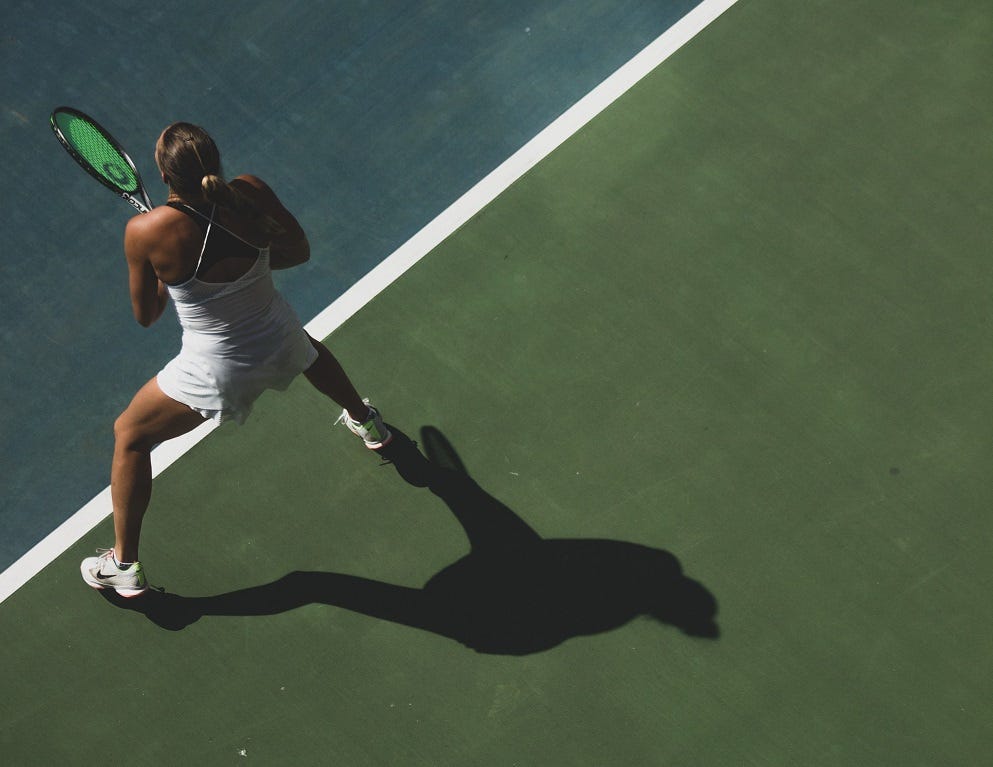The Curious Case of Simona Halep's Absence
Former winner Halep won't be featuring in this year's French Open but what does the future hold for the Romanian tennis star?
Even as I type this I have one eye on the 2023 French Open which is minutes away from kick-starting with its first round matches.
And while most of the top guns will be taking to court - minus the King of Clay, Rafael Nadal himself, of whom we had spoken last week - the tournament will be conspicuous by the absence of a former winner and world number one. Simona Halep.
Roland Garros has been her most triumphant Grand Slam, and the absence of her presence in the women's draw feels incomplete.
Our partner for today’s newsletter is Refind.
Every day the Refind newsletter picks FIVE articles that make you smarter, tailored to your interests. What’s more, it’s free!
Whether it's career, health, relationships, science, technology or any of the 70 other topics they cover, you can take your pick and read some of the best articles, everyday.
Loved by over 200,000 curious minds!
Subscribe for free to Refind here!
It feels like an eternity since her last competitive match, and unfortunately, the current circumstances indicate that we may have to endure a longer wait.
Let me clarify that I do not wish to take sides here. Simona Halep is one of my favourite players on the WTA tour, but if she is indeed found guilty of the allegations, then such behaviour would be absolutely unacceptable.
But, until concrete evidence is presented, we must adhere to the principle that one is presumed innocent until proven guilty.
And that is where the problem lies - the road to reprieve and redemption for her has been already long - and it just got longer.
Allegations of Doping against Simona Halep
For those who may be unaware, let me provide some context.
In October of last year, it was revealed that Simona Halep had tested positive for the prohibited substance Roxadustat during the US Open. This particular drug enhances the production of red blood cells and can improve athletes' performance.
As a result, she was provisionally suspended from the tour, pending the resolution of her case by powers that be. In this case, it appears to be the International Tennis Integrity Agency (ITIA) and International Tennis Federation (ITF).
The former world number one has vehemently denied knowingly taking the substance. She even stated that experts had provided her with evidence that shows contaminated results are responsible for all this unpleasantness with doping.
Regardless of the circumstances, the crucial point remains that Simona Halep has been deprived of an opportunity to present her case.
The news of her alleged doping violation broke in October of 2022, and since then, she has endured the agony of not one, not two, but three case hearings being postponed.
This even led to the Romanian expressing her frustration recently on social media, which is justified. The rules state that she has the right to a speedy hearing - but unfortunately - that right has not been respected by the looks of it.
As a result, she has had to miss eight months of tennis action - not to miss the drop in rankings, form, and momentum.
A New Twist in the Story
To make matters worse, new charges were recently levelled against the 31-year-old by the ITIA. This time, alleged irregularities were found in her Athlete Biological Passport - following an assessment of her profile by an independent expert panel.
Anti-doping organisations employ the biological passport system to monitor an athlete's diverse blood markers over an extended duration.
This meticulous observation aims to detect any anomalies or deviations that may suggest potential violations of the rules and regulations.
So where does that leave Halep? Out of contention for Wimbledon and the related events - that’s for sure.
Will she return in time for the US Open swing? That depends on when she can get a hearing to present her side of the story - for not one but two charges now.
Some experts (here and here) reckon this second allegation could prove to be a very crucial nail in the coffin as far as Halep’s return to competitive tennis is concerned.
Clearly, all of this has taken a severe toll on her mental health. From scrutinising her fans and tennis followers to derailing her career, this is not easy to bounce back from.
Let’s not forget that Halep, now in her 30s, may very well have only a few solid years remaining before the inevitable farewell starts (I would be happy if I’m proven wrong on this).
This is clearly a challenging ordeal for Simona, who is now #34 on the WTA rankings. She has even expressed frustration with the governing bodies, claiming they are destroying her reputation.
Well, who could blame her?
Imagine you are accused of something and then left at the mercy of the accusers to plead your case.
Not the Only Player?
This incident does remind me of Dayana Yastremska, a 23-year-old Ukrainian who faced doping suspension in early January 2021 after testing positive for the WADA-prohibited substance mesterolone.
She filed multiple appeals - one with ITF, and after that was dismissed, another with the Court of Arbitration for Sport (CAS). The latter was fast-tracked - so that she could compete in the Australian Open (which started on February 8) if found innocent.
The CAS dismissed her appeal in February and two more times, in April and May - the latter being a plea to turn around the decision given in April.
It was not until late June that ITF finally found her innocent and announced that she bore “no fault or negligence.”
Of course, all of this does not mean that time should not be taken to arrive at decisions that can impact players' careers - but the question then is how much time is too much time?
Fair play means fair play; the punishment should be served if found guilty of doping. It happened to Maria Sharapova in 2016, following which she was handed a 15-month ban from the tour.
It also happened to Martina Hingis in 2007, and back then, the ITF rules were a lot more stringent than they are today. Hingis retired from professional tennis in the early 2000s but briefly returned in 2006.
In November 2007, she tested positive for benzoylecgonine, a metabolite of cocaine and subsequently announced her temporary retirement. She denied the charges but accepted a two-year ban.
Also Read:
But this is where it gets interesting.
The urine sample provided by Hingis contained approximately 42 nanograms per millilitre of benzoylecgonine. According to the International Tennis Federation's report, this concentration was extremely low.
Consequently, it would not trigger a positive result in many drug testing programs, such as the one utilised by the US military, which sets a screening threshold of 150 ng/ml.
Hingis appealed the findings, contending that the low amount suggested contamination rather than intentional consumption as the probable cause.
At the time of Hingis's suspension, the ITF mandated a two-year suspension for players testing positive for banned substances, regardless of mitigating factors like contamination or low detection levels. The rules have changed since, of course.
But what if the player is innocent - which should be an assumption until proven guilty, as I stated before?
Imagine spending a year or two under suspension, only to have them announce that it is all good, and you are cleared of all charges. Who is responsible for the time wasted, then?
Returning to Halep, the fact that she has been handed new charges whilst not being given a chance to defend the old ones is absurd.
She should be allowed to make her case and exercise her right to make a swift decision.
The onus is also on governing bodies to realise that dragging their feet through the mud in matters like these harm the players more - especially if they are innocent.
We still have the French Open to look forward to until we hear more about Halep’s tumultuous ordeal with these allegations. Until next time!
Dealing with Setbacks in Tennis
While it’s tough to recommend how to overcome a setback like a doping - or even a match-fixing - suspension or a ban from tennis, there are other instances where tennis can become a very lonely sport.
Especially while dealing with injuries. Or other such setbacks.
Which is why here’s a piece worth reading for those either pursuing this sport at any level or even want to understand what tennis players go through.
Written by former ATP player and current tennis coach, Jean-Yves Aubone, it speaks about dealing with injuries and setbacks in tennis.






I do support making sure tennis stays a clean sport, but that also means that the professional players should have the opportunity to address charges that made.
who will pay if Simona prove her innocence ?
8 months ...delay , 3 adjournments ?!! why ? if ITF /ITIA have the proof of her guilt ?!!
Shame on ITF/ITIA...